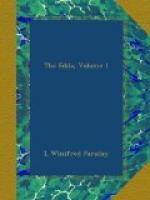For Ragnaroek also a heathen origin is at least as probable as a Christian one. I would suggest as a possibility that the expectation of the Twilight of the Gods may have grown out of some ritual connected with the eclipse, such as is frequent among heathen races. Such ceremonies are a tacit acknowledgment of a doubt, and if they ever existed among the Scandinavians, the possibility, ever present to the savage mind, of a time when his efforts to help the light might be fruitless, and the darkness prove the stronger, would be the germ of his more civilised descendant’s belief in Ragnaroek.
By turning to the surviving poems of the Skalds, whose dates can be approximately reckoned from the sagas, we can fix an inferior limit for certain of the legends given above, placing them definitely in the heathen time. Reference has already been made to the corroboration of the Valhalla belief supplied by the elegies on Eirik Bloodaxe and Hakon the Good. In the former (which is anonymous, but must have been written soon after 950, since it was composed, on Eirik’s death, by his wife’s orders), Odin commands the Einherjar and Valkyries to prepare for the reception of the slain Eirik and his host, since no one knows how soon the Gods will need to gather their forces together for the great contest. Eyvind’s dirge on Hakon (who fell in 970) is an imitation of this: Odin sends two Valkyries to choose a king to enter his service in Valhalla; they find Hakon on the battle-field, and he is slain with many of his followers. Great preparation is made in Valhalla for his reception, and the poet ends by congratulating Hakon (who, though a Christian, having been educated in England, had not interfered with the heathen altars and sacrifices) on the toleration which has secured him such a welcome. A still earlier poet, Hornklofi, writing during the reign of Harald Fairhair (who died in 933), alludes to the slain as the property of “the one-eyed husband of Frigg.”
Several Skalds mention legends of Thor: his fishing for the World-Snake is told by Bragi (who from his place in genealogies must have written before 900), and by Ulf Uggason and Eystein Valdason, both in the second half of the tenth century; and Thjodulf and Eilif (the former about 960, the latter a little later) tell tales of his fights with the giants. Turning to the other Gods, Egil Skallagrimsson (about 970) names Frey and Njoerd as the givers of wealth; Bragi tells the story of Gefion’s dragging the island of Zealand out of Lake Wener into the sea; and Ulf Uggason speaks of Heimdal’s wrestling with Loki.
The legend of Idunn is told by Thjodulf much as Snorri tells it: Odin, Hoeni and Loki, while on a journey, kill and roast an ox. The giant Thiazi swoops down in eagle’s shape and demands a share; Loki strikes the eagle, who flies off with him, releasing him only on condition that he will betray to the giants Idunn, “the care-healing maid who understands the renewal of youth.” He does so, and the Gods, who grow old and withered for want of her apples, force him to go and bring her back to Asgard.




